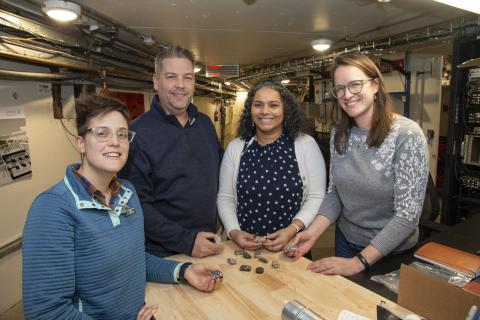A team of collaborators from the Cornell High Energy Synchrotron Source (CHESS), Cornell’s College of Engineering, Rochester Institute of Technology, Australia’s CSIRO and Industry have been selected to participate in the National Science Foundation's (NSF) Convergence Accelerator, a program that supports interdisciplinary research solving societal challenges.
The project, dubbed AUGER (Accelerating Use of Geologically-driven Engineering & Reclamation), was awarded $739K of funding from NSF’s Convergence Accelerator to support translational research combining x-ray and hyperspectral imaging capabilities at CHESS with remote sensing techniques to link macroscale data with microscale mineral properties to create predictive mining insights.
This convergence research has the potential to improve our understanding of mineral resources and may lead to breakthroughs in the sustainable extraction of rare earths, critical minerals and other resources from mine waste materials. The effort could reimagine our approach to obtaining minerals resources for critical technologies such as batteries, semi-conductors and next generation building materials.
“We are thrilled to be selected for this program," says Dr. Karin Olson Hoal, Principal Investigator for the Project and the Wold Family Professor in Environmental Balance and Human Sustainability in Earth and Atmospheric Sciences at Cornell’s College of Engineering.
"This award will allow us to bring together experts from different fields to work on a cutting-edge research tool that could have a significant impact on a variety of industries and communities."
The NSF's Convergence Accelerator program is designed to support research teams that are working to solve grand challenges at the intersection of multiple scientific and engineering fields. CHESS's selection for the program is a testament to the innovative and interdisciplinary nature of the research being conducted at the facility.
